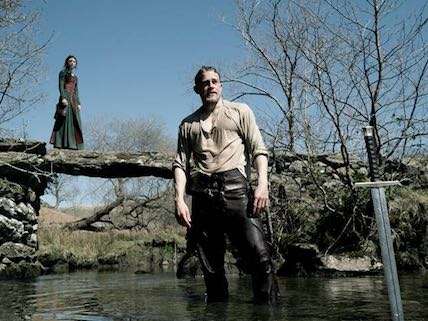Movie Review: Snatched and King Arthur: Legend of the Sword
Amy Schumer bounces back, Guy Ritchie returns with a thud.

How you feel about Snatched will probably depend on how you feel about Amy Schumer at this point. Did you love her in Trainwreck? Were you then puzzled by the awkward misfire of her Netflix special a few months back? Is she now the new Anne Hathaway, a once-beloved female performer suddenly judged by the entertainment media to have exceeded her sell-by date? Hathaway has bounced back from that ritual drubbing; can Schumer do it, too?
Snatched seems unpromising in bare outline. A mouthy, abrasive woman named Emily (Schumer), stuck with a pair of nonrefundable plane tickets after being dumped by her boyfriend, persuades her agoraphobic mom, Linda (Goldie Hawn), to join her on a vacation in Ecuador. Together, these two well-off white women venture down among the brown peoples of the Amazon Basin, and the high-end tourist resorts in which many of them—those not engaged in terrorist activities at any rate—are employed. Risks are taken (mother and daughter put their trust in a dubious hunk), adventures are had (they get kidnapped), and at the end of a brisk 90 minutes, a little potted lesson about the Important Things in Life is learned.
Sounds like a hard pass, right? And yet Snatched is in fact a funny movie. Writer Katie Dippold (The Heat) has set up some wonderfully silly scenes and sprinkled them with tart, zingy lines, and Schumer and her well-selected castmates happily dig in. It must be said that Hawn, returning to the screen after a 15-year absence, isn't given many memorable things to do (although when Emily wonders if she hit an attacking bad guy too hard in the head with a shovel, Linda does get to say, "I saw his brains"). But scene-stealing is otherwise rampant on the part of Ike Barinholtz, playing Emily's hyper-wussy brother; Wanda Sykes and Joan Cusack as fellow vacationers (Cusack's mute character is a "special ops" vet who cut out her own tongue to hinder the possibility of divulging classified information); and especially Christopher Meloni, who takes over the picture for a brief stretch playing a jungle adventurer not unlike Indiana Jones (although, as it turns out, not enough not unlike him).
Director Jonathan Levine (The Night Before) was fortunate in having a way-overqualified cinematographer (Florian Ballhaus, who also shot the glowing Devil Wears Prada) to work with on his Hawaiian locations. And although he's unable to explain what the terrorist kidnappers are so up-in-arms about (because the script doesn't), Levine does get to preside over a nice yucky scene in a jungle clinic in which Emily is found to be inhabited by a tape worm—and a strip of meat is dangled over her mouth to coax it out.
Otherwise, Levine pretty much stands aside and lets Schumer rip. She once again segues easily from sweet vulnerability to whiny irritation, and once again puts her own delectable spin on girly raunch. At one point a guy Emily is thinking of hooking up with spots the elaborate tramp stamp emblazoned above her butt and asks, "Is that finished?" "Well, people have finished on it," she says.

King Arthur: Legend of the Sword
How you feel about King Arthur: Legend of the Sword will definitely depend on how you feel about its cowriter and director, Guy Ritchie. In the nearly 20 years since he scored a critical hit with his low-budget debut, Lock, Stock and Two Smoking Barrels, Ritchie has evolved a wildly overamped filmmaking style that is more about itself than whatever narrative subject is purportedly under consideration. Several of his previous movies, like RocknRolla and Revolver, have been gaudily preposterous; but two of them—his Sherlock Holmes films, with Robert Downey Jr. and Jude Law—have also been ragingly profitable. The same may prove to be true of Ritchie's latest, King Arthur: Legend of the Sword. The movie has acres of action and pantloads of CGI—two of the major ingredients for international box-office domination. However, it is also quite gaudy—in the dreary, dun-colored manner of so many Ye Olden Times films—and it is, yet again, preposterous.
Whatever one might want in a King Arthur story—noble knights, chaste romance, a swirl of magical fantasy—it's hard to imagine anyone really wanting what we have here. Hard, but of course not impossible. I'll be brief.
Ritchie's Arthur, gamely played by Charlie Hunnam, is an orphan who's unaware he has royal blood. Following the murder of his father, King Uther Pendragon (Eric Bana), the baby Arthur, like the baby Moses, was floated off to safety in a little boat. He was found by prostitutes and raised in a bordello. (This is not your grandpa's King Arthur.)
As a grownup, Arthur is an aimless yob on the streets of old Londinium—until a bunch of stuff happens and he finds himself standing in line with a group of other reprobates waiting to have a go at pulling a big old sword out of a rock. He wins this odd contest, and with Excalibur in hand he soon finds himself being guided by a magicky woman called Mage (Astrid Bergès-Frisbey), and leading a band of likeable louts with names like Goosefat, Wet Stick, and Kung-Fu George. (I know, I know—I'm not making this up.) Before long, they're all off to confront Arthur's evil uncle, Vortigern (Jude Law), now the king, and a man so hateful he says things like, "When people hate you, it's intoxicating." (Law is the only actor in this film who appears to be having fun.)
Ritchie's penchant for cheeky anachronisms is in fullest flower. Here we have Arthur chatting up Mage with the line, "Are you fallin' for me like I'm fallin' for you?" And Kung-Fu George apologizing to Arthur for some infraction with the phrase "Sorry, boss." And, inevitably, Vortigern berating a lackey with the words, "Just do your fucking job!"
Ritchie wheels out all the usual slash-and-clang medieval battle action. He gives us giant lurching elephants, sprawling tentacle monsters, and a couple of nice eerie images (in one of them we see the ocean ominously draining away from the shore of a seaside village). But the movie's few good moments are crushed by Ritchie's trademark 10-ton stylistic overkill. Yet again.


Show Comments (69)